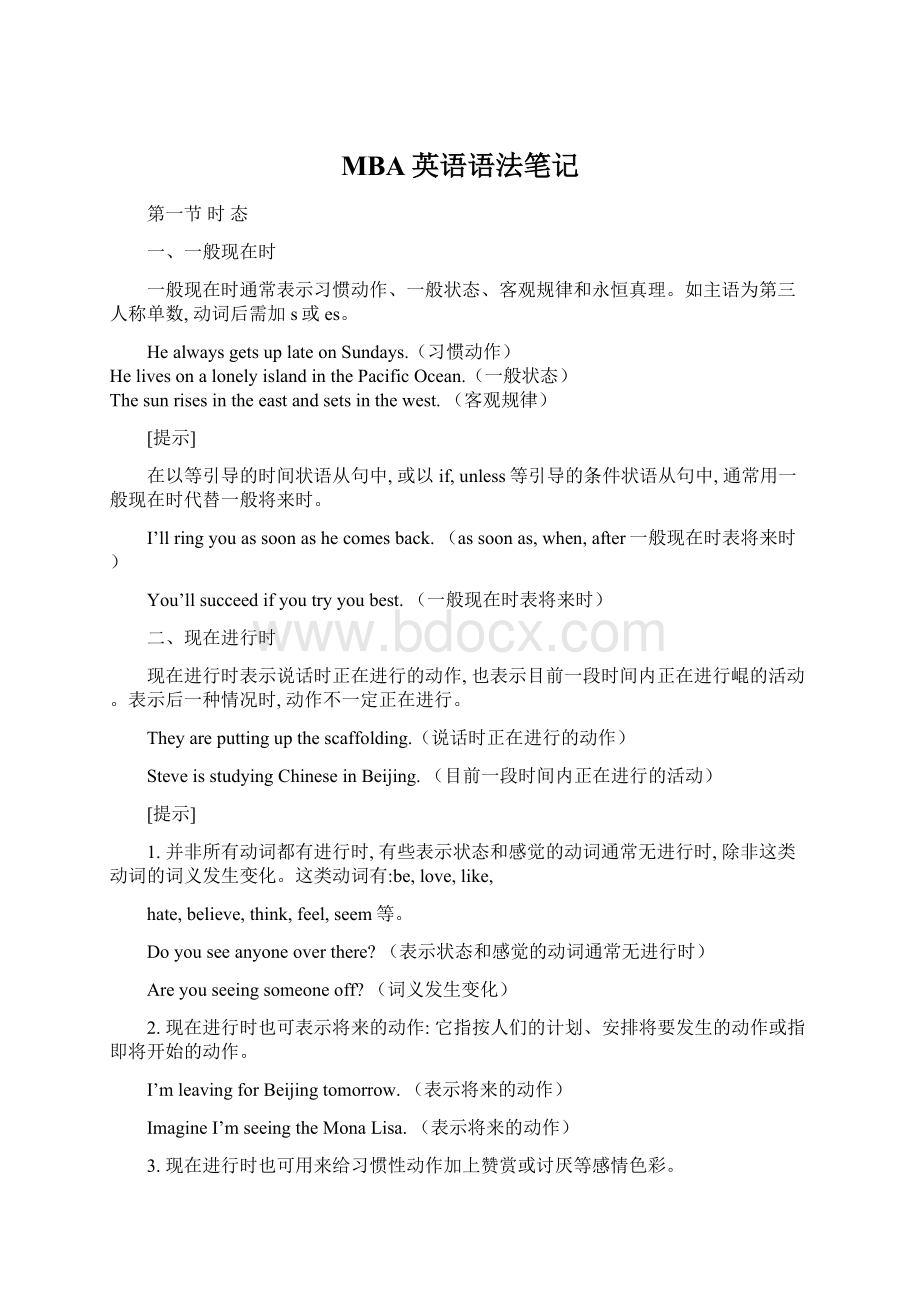MBA英语语法笔记.docx
《MBA英语语法笔记.docx》由会员分享,可在线阅读,更多相关《MBA英语语法笔记.docx(29页珍藏版)》请在冰豆网上搜索。

MBA英语语法笔记
第一节时态
一、一般现在时
一般现在时通常表示习惯动作、一般状态、客观规律和永恒真理。
如主语为第三人称单数, 动词后需加s或es。
He always gets up late on Sundays.(习惯动作)
He lives on a lonely island in the Pacific Ocean.(一般状态)
The sun rises in the east and sets in the west. (客观规律)
[提示]
在以等引导的时间状语从句中,或以if,unless等引导的条件状语从句中,通常用一般现在时代替一般将来时。
I’llringyouassoonashecomesback.(assoonas,when,after一般现在时表将来时)
You’llsucceedifyoutryyoubest.(一般现在时表将来时)
二、现在进行时
现在进行时表示说话时正在进行的动作,也表示目前一段时间内正在进行崐的活动。
表示后一种情况时,动作不一定正在进行。
Theyareputtingupthescaffolding.(说话时正在进行的动作)
SteveisstudyingChineseinBeijing.(目前一段时间内正在进行的活动)
[提示]
1.并非所有动词都有进行时,有些表示状态和感觉的动词通常无进行时,除非这类动词的词义发生变化。
这类动词有:
be,love,like,
hate,believe,think,feel,seem等。
Doyouseeanyoneoverthere?
(表示状态和感觉的动词通常无进行时)
Areyouseeingsomeoneoff?
(词义发生变化)
2.现在进行时也可表示将来的动作:
它指按人们的计划、安排将要发生的动作或指即将开始的动作。
I’mleavingforBeijingtomorrow.(表示将来的动作)
ImagineI’mseeingtheMonaLisa.(表示将来的动作)
3.现在进行时也可用来给习惯性动作加上赞赏或讨厌等感情色彩。
Sheisalwayscookingsomedeliciousfoodforherfamily.(感情色彩)
Heisalwaysfindingfaultwithhisemployees.(感情色彩)
三、现在完成时
现在完成时表示目前已完成的动作或刚刚完成的动作,也可表示从过去某一刻发生,现仍延续着的动作或情况。
此时态强调动作对现在的影响。
Theconferencehaslastedforfivedays.(已完成的动作)
He’sjustboughtannuusualtaxi.(刚刚完成的动作)
[提示]
1.当句子中出现表示到现在为止这段时间的状语时,谓语动词一般用现在完成时。
此类状语有upto(till)now,sofar,thesedays,thissummer,for…(后接一段时间的短语),
since…等。
Wehaven’tseeneachotheragainsincewegraduatedin1987.
2.句中谓语动词是用一般过去时还是用现在完成时主要取决于动作是否对现在有影响。
Whatdidshesayaboutit?
IhavelivedinNanjingfor15years.(对现在有影响)
四、一般过去时
一般过去时表示过去某个特定时间发生且一下子就完成的动作,也可表示过去习惯性的动作。
一般过去时不强调动作对现在的影响,只说明过去。
IhadawordwithJuliathismorning.(一下子就完成的动作)
Hesmokedfortycigarettesadayuntilhegaveup.(习惯性的动作)
[提示]
1. 一般过去时常与表示过去的时间状语或从句连用, 如yesterday, last week, in 1993, at that time, once, during the war, before, a few days ago, when …等。
2.“used to+动词原形”表示“过去常常”而现在已停止的习惯动作。
He used to work fourteen hours a day. (过去常常)
另外, 注意区别“used to”和“be used to”。
后者意为“习惯于…”, to为介词, 后跟名词或动名词。
She is used to hard work.
她习惯于艰苦工作。
五、过去进行时
过去进行时表示过去某时正在发生的动作, 也可表示过去某段时间内正在发生或反复发生的动作。
Yesterday afternoon Frank Hawkins was telling me his experiences as a young man. (过去正在发生)
Bill was coughing all night long. (过去反复发生)
六、过去完成时
过去成时表示过去某时之前已完成的动作或状况。
在时间上, 它属于“过去的过去”。
在句中常有明显的参照动作或有表示“到过去某时为止”的时间崐状语。
By the end of the war, the small workshop had become a large factory.
They found that a stream had formed in the field.
七、一般将来时
一般将来时表示某个将来时间会发生的动作或情况, 也可表示将来反复发生的动作或习惯性的动作。
He will take part in an important race across the Atlantic. (将来发生)
The students will have five English classes per week this term. (将来反复)
[提示]
be going to, be to, be about to等也可表示将来发生的动作, 但它们常常表示打算、计划、安排和即将要发生的动作。
will表示说话人认为、相信、希望或假定要发生的动作或情况。
八、将来进行时
将来时间时表示将来某时正在发生或持续的动作。
其构成:
will+be+动词的现在分词。
I’ll be reading this time tomorrow. (将来正在进行)
Most of the young people in the town will be meeting them at the station.(持续)
九、将来完成时
将来完成时表示将来某时前已完成的动作, 它与可用来表示推测。
They will have stayed here for five months next week. (将来完成)
By the end of next month, they will have studied twenty passages. (推测)
十、现在完成进行时
现在完成时间时表示从过去某时开始一直持续到现在的动作。
此动作或情况可能已停止, 也可能继续下经也可表示刚结束的动作。
I’ve been working for IBM for 15 years.
I’ve been waiting for an hour but she still hasn’t come.
[提示]
现在完成时和现在完成进行时的区别是:
前者一般表示已结束的动作或情况, 它强调对现在的影响。
后者一般表示仍在进行或刚刚还在进行的动作或情况, 它强调动作的延续性。
I have thought it over.
我已经考虑过这件事了。
I have been thinking it over.
我一直在考虑这件事。
Be carful!
Peter have been painting the car.
注意!
彼得刚才还在给这部车上油漆。
(油漆尚未干)。
第二节 语 态
被动语态常用于下列几种情况:
一、动作的执行者无需指出或不明确时
Printing was introduced into Europe from China.
Rome was not built in a day.
二、为了强调动作的承受者
Four people were killed and thirty-one injured in the bomb attack.
Susan was singled out for praise yesterday.
三、为了修辞的需要
He started to complain about this wicked world but was interrupted by a knock at the door.
Yesterdayu he visited our university and was welcomed by the President.
[提示]
1. 除及物动词外, 一些相当于及物动词的短语动词也可作用被动态形式, 除个别情况外, 短语动词一般不拆开使用。
This matter will be dealt with as soon as possible.(短语)
2. 不及物动词(或相当于一个不及物动词的短语动词)和表示状态的动词(或短语动词)无被动态形式, 如happen, rise, occur, take place, break out等; 以及lack, fit, suit, equal, become, resemble, befall, consist of,look like等。
The story took place in 1949.
3. 将主动态形式改为被动态形式时如遇到动词后跟双宾语的情况, 我们只能将其中之一变成主语, 另一个保持不变。
当直接宾语变成主语时, 保持在原位的间接宾语前需加介词to。
I gave my hasband a tie as a birthday pressent.
→My hasband was given a tie as a birthday present.
→A tie was given to my husband as a birthday present.
第三节 虚拟语气
一、虚拟式用于非真实条件句时的构成
If I had time, I would go to the movies with you.
If we hadn’t made adequate preparations, the conference, wouldn’t have been so successful.
If it were to rain tomorrow, the game would be put off.
[提示]
1. 在非真实条件句中, 有时从句的动词所表示的动作和主句的动词所表示的动作并不同时发生,这样的条件句中使用的虚似式称为混合虚拟式。
其构成视具体情况而定。
If I had taken my raincoat when I came out this morning, I would not be wet now.
If I were you, I wouldn’t have missed the film last night.
2. 引导非真实条件从句的连词if在正式文件中有时可以省去, were, had,
should等非行为动词这时应提到从句句首。
If I were you, I wouldn’t feel sorry.
→Were I you, I wouldn’t feel sorry.
3. 有些句子从表层结构上看无if引导的非真实条件句, 但从深层意思上看是存在的。
这种情况下主句动词仍需用虚拟式。
这类句子中常出现without(如果没有), but for(要不是),otherwise(否则), but that(若不, 后接一从句)等词或词组。
But for your help, they couldn’t have succeeded.
要不是你的帮助, 他们就不会取得成功。
She wasn’t felling well. Otherwise she wouldn’t have left the meeting so early.
她感不舒服。
不然她不会那么早就离开会场的。
二、虚拟式也可用于其他情况
1. 在it’s necessary (important, natural, essential, proposed, required,
suggested, impossible, strange) that…引导的真正的主语从句中动词应用虚拟式,
表示必要、应该、建议、要求、惊讶、不相信等意。
It’s necessary that we (should) set out at once.
It’s proposed that a committee (should) be set up to look into the matter.
It’s only natural that you should be nervous. 你感到紧张是很自然的。
The dentist suggested that she (should) come another day.
It is highly important that we (should) combine revolutionary sweep with
practicalness. "对我们来说,把革命气概和实际精神结合起来是很重要的。
"
It is impossible that he should have missed the train. 他不可能误车。
It’s strange that he should have failed in the exam.
2. 在ask, require, order, demand, suggest, propose, command, insist?
等动词后的宾语从句中, 动词也用虚拟式, 表示命令、建议、要求等。
I suggest that we (should) go camping tomorrow.
He insisted that our laboratory reports (should) be handed in the day afterthe experiment was done. 他坚持要求我们在做完实验后第二天将实验报告交上来。
He asked that they (should) be allowed to use a dictionary.他要求准许他们用词典。
The director required that we should work all night主任要求我们通宵工作。
The mayor ordered that free food be distributed.市长命令发放免费食品。
The boss demanded that Mary (should) finish it within a week.老板要求玛丽在一周内完成它。
I propose we should have another meeting. 我提议我们再开一次会议。
I command that he go at once.我命令他立即就去
注意,以上句中insist意为“坚持要求”。
如insist作“坚持认为”解, 则不需用虚拟式。
He insisted that he was right.
他坚持认为他是对的。
3. 虚拟式可用于wish后的宾语从句中, 表示与事实相反的愿望。
I wish I had been to the concert last night.
I wish he would forgive me.
4. It’s (high, about) time that…的句型要求用虚拟式, 表示应该做还没做的事。
((时节)正盛的;(时机)成熟的)
It’s high time that he stopped smoking.
It is high time you made up your mind.你该拿主意了。
It’s about time that we took our leave.
5. 在I would (had) rather后的句子中, 动词也要求用虚拟式, 表示某人的愿望。
I’d rather you left tommorrow instead of today.
I’d rather he hadn’t done anything like that.
6. 在as if (though) 引导的状语从句中, 谓语动词有时用虚拟式。
She looks as if she knew all about it.
They talked as though they had got acquainted with each other for years.
第四节倒装
倒装语序有两类:
全部倒装和部分倒装。
全部倒装:
指谓语部分全部提到主语之前;
部分倒装:
指谓语的一部分提到主语之前。
倒装语序常出现在下列情况中:
1.为避免句子部分内容重复,英语中常用倒装句,即:
so(neither,nor)+be动词(助动词,情态动词)+主语。
Myfaterisanengineer;soismyhusband.
Janedidn’tattendmyclassyesterday;nordidTorris.
"Johncan’tswim.""NeithercanI.""约翰不会游泳。
""我也不会。
"
[提示]如表示赞同别人的陈述,so后面的部分不倒装。
"Jimisagood-swimmer."
"Soheis,andsoisDick."
2.具有否定意义的词或短语置于句首时,句子一般部分倒装,即将be动词、助动词或情态动词提到主语前。
这类词或短语包括:
not,never,seldom,hardly,rarely,scarcely,bynomeans,undernocircumstances,innoway,atnotime,nosooner…(then),hardly…(when),notonly…(butalso)等。
Neverhasmybrotherbeenabroadbefore.
HardlyhadIsatdownwhenIheardsomeoneknockingatthedoor.
Nosonnerhadhereturnedthanheboughtafinehouseandwenttolivethere.
Atnotimeshouldyougiveupstudying.在任何时候你都不应放弃读书。
[提示]
(1)如果句首的否定词修饰主语,是主语的一部分,则句子不用倒装。
Scarcelyadropofrainfelllastmonth.
(2)as或though引导的让步状语从句常用倒装。
一般将一些形容词、副词等置于句首。
Prominentasheisinhisfield,heremainseasy-going.
Wealthyasheis,Idon’tenvyhim.
3.当so,often,only等表示程序或频率的副词置于句首时,句子一般倒装。
Sogreatwasthedestructionthatthesouthtookdecadestorecovery.
Oftendoeshewarnusnottotouchthepoisonouschemical.
Onlyinthiswaycanweaccomplishitontime.
4.当there,here,then,now等副词置于句首,且谓语动词为come,go,be等词时,句子一般全部倒装。
此类倒装句旨在引起别人注意。
但如果主语是代词。
句子则不倒装。
Look!
Herecomesthetaxi.
Herearesomelettersforyoutotype.
Thencamethechairman.
5.当out,in,away,up,bang等方位或拟声词置于句首时,句子一般全部倒装。
此类倒装句比正常程序的句子的更生动、形象。
但如主语是代词,句子则不倒装。
Awayflewthebird.
Banggoesmyace.
Awayshewent.
Aheadsatanoldwoman.
第五节从句
从句按其在主句中的句法功能可分为三类:
即名词性从句、形容词性从句(即定语从句)和副词性从句(即状语从句)。
引导从句的词称作关联句.
一、名词性从句
引导这些名词性从句的关联词包括:
从属连词that,if,whether;
连接代词who,whoever,whom,whomever,which,whichever,what,whatever,whose;
连接副词where,when,why,how。
其中,从属连词只起连接作用,在从句中不充当任何句法成分,
而连接代词和连接副词既起连接作用,在从句中又充当一定的成分.
ThatOwenshouldhavemarriedhiscousinisnotatallsurprising.
Thefactisthathedidn’tgotothedinnerparty.
Idon’tknowifhewillattendthemeeting.
HaveyouheardthenewsthatMaryisgoingtomarryTom?
你听说玛丽要和汤姆结婚的消息了吗?
(that引导同位语从句)
[提示]
1.在含有主语从句的复合句